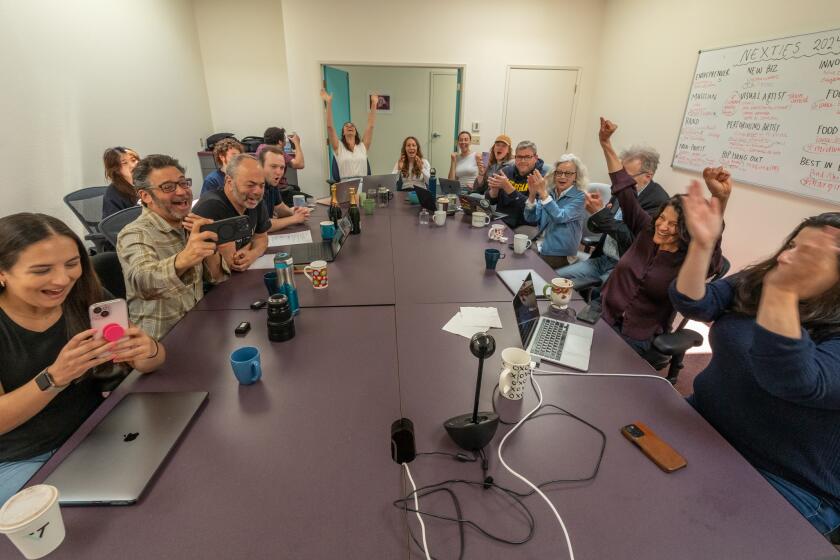Garamendi Wants Chairman of Holocaust Panel to Resign
California Insurance Commissioner John Garamendi on Thursday called on former Secretary of State Lawrence Eagleburger to resign as chairman of a special international commission that was created to resolve the claims of Holocaust survivors and their heirs that European insurance companies were failing to honor $1 billion in valid policies.
“I have lost confidence in Mr. Eagleburger, and I think it is time for him to go,” said Garamendi, one of three U.S. regulators who is a member of the International Commission on Holocaust Era Insurance Claims, which has offices in Washington and London.
“I am very disappointed and very concerned about the lack of progress the ICHEIC has achieved. It seems they are more often interested in protecting the companies than in providing quick and appropriate payments to survivors,” Garamendi said.
Eagleburger “has no intention of resigning,” said Anais Haase, his executive assistant.
Garamendi spoke out just hours after three elderly Holocaust survivors, who said they had been trying for more than 50 years to collect on policies, called for Eagleburger’s ouster. The three made the demand at a news conference at the Los Angeles Museum of the Holocaust, where they also announced that they were suing the commission.
“We should recall Eagleburger from this position,” said Dr. Jack Brauns, 73, of West Covina, who was freed from Dachau in 1945. Holocaust survivors Si Frumkin, 72, of Studio City, and Manny Steinberg, 78, of West Hills, also said that Eagleburger should resign, as did Claremont attorney William Shernoff, the lead lawyer in the lawsuit. Shernoff also represents a dozen other survivors.
The suit alleged that the agency has improperly delayed or denied payments of more than $1 billion in insurance proceeds to Holocaust survivors or their heirs who held policies before and during World War II.
Filed in Los Angeles County Superior Court under the state’s Unfair Business Practices statute, the suit asserts that the commission is biased in favor of Assicurazioni Generali, a large, Italian-based insurer with U.S. ties that wrote thousands of policies in Eastern Europe before the outbreak of World War II.
The claims commission was formed in 1998. At the time, backers said that it would provide much swifter resolution of claims than would occur with protracted litigation.
But since then, the organization has been consistently criticized for failing to achieve that goal.
At a congressional hearing last week, Rep. Henry Waxman (D-Los Angeles) said that “approximately 80% of claims are still in limbo.” He said that many claimants were caught in a “Catch-22” because “the Nazis often destroyed the records held by persons imprisoned in the concentration camps” and “many of the insurance companies who issued these policies won’t disclose complete lists of their policyholders.”
California enacted a law in 1999 requiring any insurer doing business in the state to disclose information about any policies sold in Europe from 1920 to 1945. Companies that failed to comply could lose their licenses to do business in the state.
Last June, however, the U.S. Supreme Court overturned the law, ruling 5 to 4 that the state was improperly interfering with the conduct of foreign affairs.
At the congressional hearing on Sept. 16, Eagleburger said that 5% of the 54,000 claims submitted to the commission have been paid by the companies. He acknowledged that the commission had spent 60% more on its operations -- including travel, hotel bills and his $360,000 annual salary -- than it had persuaded the companies to pay in claims.
So far, Eagleburger said, the commission had spent $56 million and obtained offers of $35 million in claims payments.
On Thursday, Brauns, the camp survivor, said insurance companies hoped the survivors would “die of old age before they have to be paid.”
Survivors are not allowed to attend agency meetings, according to the lawsuit. Its rulings “are not subject to any judicial review or supervision, and are influenced by Generali, which funds ICHEIC operations and whose representatives attend all ICHEIC meetings,” the suit alleged.
“It is a travesty of the judicial process to allow claims decisions to be made by a claims panel that gets its money” from an insurance company whose conduct is at issue, Shernoff said.
The suit, which was filed under the state’s Unfair Business Practices statute, asks a judge to order the commission to publish on its Web site at least the names of “100,000 unpaid Holocaust era life insurance policies that Generali has admitted exist.”
Christopher Carnicelli, president of Generali’s New York office, said, “The lawsuit is baseless, misleading and does not reflect the reality that thousands of individual claimants, including several of Mr. Shernoff’s own clients, have and will continue to be paid and offered generous amounts through ICHEIC, which is supported by leading Jewish Holocaust restitution organizations and the state of Israel.”
Carnicelli said Generali had contributed more than $150 million to Holocaust restitution.
Eagleburger issued a statement saying that the commission was “committed to resolving unpaid insurance claims of the Holocaust era.... It has paid millions in claims and has allocated over $130 million for the ... needs of Holocaust survivors.”
Roman Kent, chairman of the American Gathering of Holocaust Survivors, a commission member, defended Eagleburger, saying that the chairman had done his best under the circumstances.
But Garamendi said there was a “fatal flaw” in the commission’s structure. Although U.S. regulators played a role in forming the commission and serve on it, they “have no direct power. We do not hire or fire or control the budget. The insurance companies seem to have the power. He who pays the piper calls the tune,” Garamendi said.
More to Read
Start your day right
Sign up for Essential California for news, features and recommendations from the L.A. Times and beyond in your inbox six days a week.
You may occasionally receive promotional content from the Los Angeles Times.






